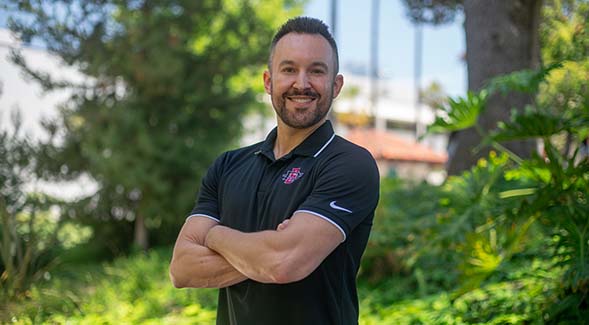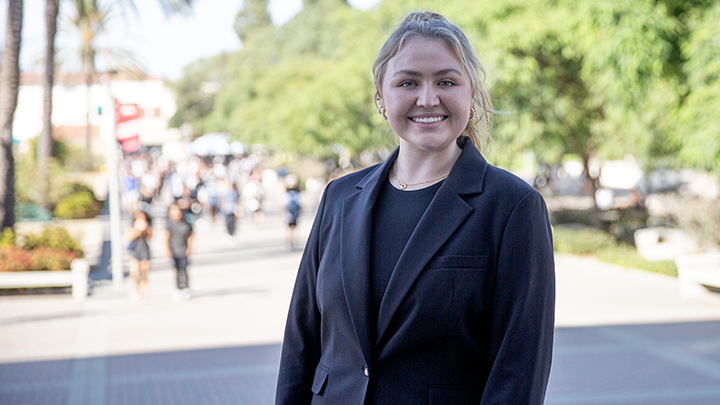SDSU Educator Works to Improve Safety, Inclusion for LGBTQIA+ Youth
Educational Leadership assistant professor Vinnie Pompei is part of a state committee creating a new cultural competency training course for educators.

Vinnie Pompei looks at the data with grave concern. The assistant professor in San Diego State University’s Department of Educational Leadership is an expert in the safety and inclusion of LGBTQIA+ youth in K-12 schools, so when he looks at a recent study indicating 50% of LGBTQIA+ youth between the ages of 13-17 have seriously considered attempting suicide, he sees a clear canary in a coal mine.
“Since 2019, the percentages have increased each year, with rates even higher for trans and non-binary youth and many LGBTQIA+ youth of color,” he said. “These trends should be concerning for anyone who cares deeply about children and youth. Lives are at stake.”
Pompei is taking action as part of a California Department of Education committee focused on addressing the crisis through a new LGBTQIA+ cultural competency training course for California educators. He is the only representative of higher education participating on the committee, which comes with a $10,000 grant.
The committee is the result of Assembly Bill 493, which passed in 2019 and was authored by then-Assemblymember Todd Gloria, elected mayor of San Diego the following year. Gloria had invited Pompei — then National Director of the Youth Well-Being Program for the Human Rights Campaign — to Sacramento to testify in support of the bill.
Now with funding secured, Pompei and his committee colleagues are working to create a course of six online learning modules educators can use to expand their understanding of LGBTQIA+ identities and learn how they can foster affirming environments in their schools.
“There's actually not a lot of extra stuff that teachers have to do,” Pompei said. “This is about learning different approaches for how to address certain standards, how to communicate with students and how to make sure they're addressing biases throughout the school year. If teachers can build positive relationships and positive self-esteem, school climate and student mental health outcomes will improve.”
Crisis moment
For many LGBTQIA+ young people, the past few years have been particularly trying. State legislatures nationwide have passed a spate of legislation to restrict discussion of LGBTQIA+ matters in schools.
“It’s a scary time period,” Pompei said. “What we're seeing is rhetoric that's regurgitated from many decades ago — words like ‘eradication,’ words like ‘grooming,’ accusations of sexualizing children and calling LGBTQIA+ people pedophiles. All of this results in more bullying, more harassment and more mental health challenges, including suicide.”
At the same time, LGBTQIA+ youth become less likely to go to adults on campus when they need support.
“It's having devastating impacts,” he said. "Well-established research indicates we should be creating safe, welcoming, and affirming learning environments for LGBTQIA+ students, not creating obstacles to their ability to learn and thrive."
Affirming Classrooms
The new module aims to create LGBTQIA+ Affirming Classrooms by educating teachers and other staff on several key points. The content will clarify what sexual orientation, gender identity and gender expression (SOGIE) mean and what the law, education code and professional standards require. California educators, Pompei said, are often surprised to learn that there are numerous state laws and policies protecting LGBTQIA+ students in California public schools.
“Decades of misinformation and bias have left many to believe that the terms LGBTQ+ and SOGIE mean something sexually explicit, and are therefore inappropriate topics for schools,” Pompei said. “We need to help educators, parents and caregivers understand what these terms mean, what they don’t mean and begin to dispel the myths and misconceptions.”
The training curricula will also provide information on actions that research has shown to improve school safety for LGBTQIA+ students, particularly those who are multiply minoritized. That includes using gender-inclusive language (think “Good morning, students” instead of “Good morning, boys and girls”), integrating diverse voices and perspectives into lesson plans to break down negative biases and supporting student Genders and Sexuality Alliance (GSA) clubs.
Pompei hopes to work with College of Education colleagues to see how the modules can be integrated into teacher, school counselor and educational leadership education programs at SDSU.
“I'm interested in how we can begin to work together across departments and share best practices so that we're intentionally scaffolding SOGIE content throughout all of our programs,” he said.



